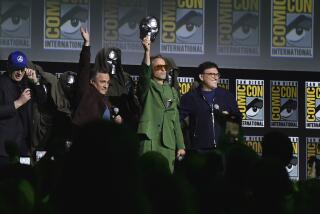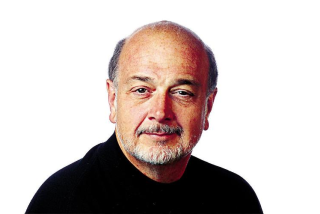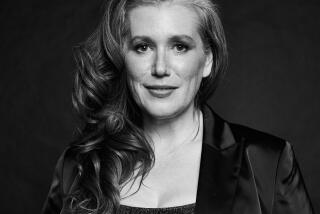Morton Downey Jr.; Made Bullying a TV Trademark
- Share via
Morton Downey Jr., whose career as an entertainer crystallized in the 1980s when he became the bombastic host of a confrontational cable TV talk show, has died.
Downey died of lung cancer and other respiratory problems at Cedars-Sinai Medical Center, his family announced Monday night. He was 67.
“The Morton Downey Jr. Show,” which ran first on the New Jersey-based cable station WWOR and was later syndicated nationally, was widely vilified as trash. But the show, which Rolling Stone magazine dubbed “part TV talk show, part public lynching,” transformed Downey into a pop culture phenomenon and spawned countless other programs that turned the generally civil talk show format into a blood sport.
Raising the volume on a persona he had cultivated over years on radio, Downey was the reactionary bully, shouting down his guests and whipping his studio audience--made up largely of white males--into a frenzy. He always had a cigarette going; Downey smoked four packs a day, on his way to a bout with cancer that would later cost him a lung.
His program, said executive producer Bill Boggs, was the fastest-rising and the fastest-falling show in syndication history. It was also a precursor of such shows as “Jerry Springer” “in terms of an audience really being vocal, chanting things and roaring reactions to things. ‘The Morton Downey Jr. Show’ was totally groundbreaking in that area--it spawned the Geraldo [Rivera] show and other shows like that.”
Downey’s talent emerged from his spleen. Although he came from a family with a rich history of Democratic politics (he had dabbled as a lobbyist), Downey indulged his angry white man side in rising to national prominence, building a career by coaxing willing targets into the ring with him--feminists and members of the Ku Klux Klan. Ostensibly debating religious, political and social topics, Downey became better known for a catalog of put-downs and angry gestures--most famously dismissing liberals as “pablum pukers.”
His nickname became “the mouth.”
“Mort was a highly competitive man,” Boggs said. “He was highly intelligent [and] could argue one point and then the other point equally well. He was an enormously talented man who also at the same time had a self-destructive streak.”
In 1988 at the height of his celebrity, Downey told The Times, “My life was threatened 33 times in radio, but I’ve only had two death threats since I went on TV, so that makes 35 overall.”
Andy Regal, who worked as Downey’s producer in radio and on television, said “The Morton Downey Jr. Show” evolved from the notion that if you see two people on the street arguing, they’ll draw a crowd. Offstage, Regal said, Downey was nothing like the vitriolic bully he appeared to be.
“Mort was a great performer,” said Regal, now vice president of original programming at Court TV. “He believed what he was saying, but he realized this was television.”
Downey was born Sean Morton Downey Jr. in 1933, the son of an Irish radio singer who reportedly traveled in well-heeled social circles that included the likes of Joseph P. Kennedy. Downey’s mother was Barbara Bennett, an actress and dancer. He was the oldest of five children.
His mercurial professional career cycled through the music business (he produced and recorded albums in the early days and one during his TV popularity) and sports (he said he helped found the New Orleans Buccaneers of the old American Basketball Assn.) as well as radio and television. As for politics, Downey said that he worked on the political campaigns of John F. and Robert F. Kennedy and that he was arrested seven times during the civil rights movement of the 1960s.
He continued in various political jobs in the 1970s, and then in 1982 got his first job in radio at WKBO in Orlando, Fla. He went on to work in six other markets, including Chicago, his last stop before leaping to television in 1987.
At WOR, where his show first aired weeknights at 9, he was signed to a seven-year deal by Bob Pittman, then head of Quantum Media and now co-chief operating officer of AOL Time Warner.
“Most TV is so obscenely tidy and polite that it’s refreshing to see people argue and get excited,” Pittman told the Times in 1988.
Not long after Downey achieved widespread attention, his ratings began to tumble. His antics got more outrageous as he tried to hang onto his audience. In 1989, Downey claimed to have been roughed up in an airport bathroom by a group of neo-Nazis, though police deemed the story a stunt to generate publicity.
“His life was perceived as out of control,” Boggs said. “His personal credibility eroded off camera. Mort’s personal image became the stuff of tabloids.”
After “The Morton Downey Jr. Show” fizzled, Downey tried more toned-down versions of himself in 1990 and ’91 shows on CNBC, and later returned to radio.
According to his Web site, he moved to Southern California in 1994 and did various guest appearances on talk shows and prime-time series. Downey also became an avid anti-tobacco activist.
Downey is survived by his wife, actress/producer Lori Krebs, and their daughter, Seanna Micaela. He is also survived by three daughters from previous marriages, Tracy, Kelli and Melissa, as well as seven grandchildren.
Funeral services will be Saturday at 2 p.m. at St. Francis de Sales Catholic Church in Sherman Oaks.
More to Read
The complete guide to home viewing
Get Screen Gab for everything about the TV shows and streaming movies everyone’s talking about.
You may occasionally receive promotional content from the Los Angeles Times.






